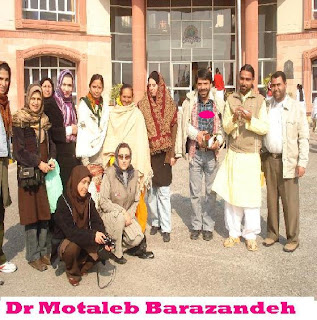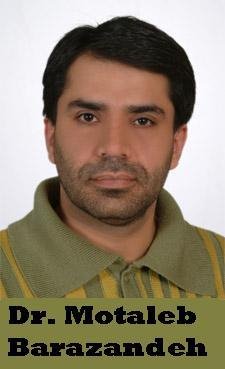 Asceticism
Asceticism
By: Dr. Motaleb Barazandeh (Ph.D);
Metaphysician and Parapsychologist Literally, asceticism means abstemiousness, and turning away from the world. From the Gnostic’s point of view, it means abandoning what is permitted for the fear of being taken into account and abandoning what is forbidden for the fear of punishment. In other words, the state of not being happy for the sake of gaining worldly matters and not feeling disappointed for the sake of losing them is called asceticism. The basics of asceticism is turning back to the world and facing the Futurity. So it is first necessary to know the world in order to abandon it with awareness. We know the world with the four elements ruling it which are: time, place, energy, and substance.
The world and whatever that is in it are tools for getting to Futurity. Therefore, Ali (PBUH) has said, “The world is a tool or a vehicle for the believer to take him to his Lord, so fix your vehicles so that they would take you to your Lord. The world is in fact like a bridge, which is used for passing from Zar to Futurity. It is a farm for Futurity, a companion for it and a wonderful vehicle for the aware. Ali (PBUH) says: “ This world is a place to leave and futurity is a place to remain, so let’s gather provisions for our permanent destination.”
The world is the lowest level in the whole universe. Ali (PBUH) said: “ The world has been giving this name because of its being the lowest thing and Futurity has been given this name for rewarding is there.” Being mortal and transient are also the other features of the world. Therefore, Adam (PBUH) told his son, Sheys, “ Do not become attached to the mortal world, because I have been attached to the eternal Heaven, but it was not loyal to me and I was sent out of it.”
The world is like a pleasant toy; full of darkness, mortal, cursed, and deceitful. In the valuable book of “Mizan-ol-Hekmat”, it has been quoted from Ali (PBUH) that, “ The prophets and the chosens have detached themselves from the world… and when pious men went after it… they saw the world like a corpse that eating from it can only be allowed in cases of need. And they ate from it as much as they could be alive and not die; and saw the world like a smelly corpse that whoever passed it by, held his nose and mouth (because of the bad smell). They had the least nourishment from the world. My brothers! I swear to God that this world, both in this world and futurity for the one who purifies his thoughts is more fetid than a corpse, but the one whose job is tannying skins is like a person who passes by the corpse or sits beside it but is not bothered by the bad smell.
The world is the origin of ever lasting sorrows, the enemy of the Futurity and the desire of the unfortunate people. This world is charming, sweet, decent, green, and colorful, but it’s a prison. Ali (PBUH) says: “The world is like a snake, when touching it, it is soft; but inside it is filled with poison. So the deceived and the naïve become interested in it and the aware and the wise escape from it”. This world is a place of poverty and emptiness and baseness. This is why “God has not chosen it for his believers and has not been stingy in giving it to his enemies. Its welfare is so little and its evil is always ready.”
Loving the world is the origin of all sins and the cause of getting far from the merciful God. Ali (PBUH) says: “In the same way that day and night can not be put together, the love for God and the love for the world can not be put together either.” Loving the world causes the destruction of the wisdom and the blindness of the heart. Loving the world is an ever-lasting sorrow, an unreachable desire, and an unreachable hope, which makes human beings blind, deaf, dumb, and inferior. Ali’s speech gives us a proof in this matter: “Let go of the world that loving the world makes people blind, deaf, and inferior.” Insolence, greed, hypocrisy, egotism, and passion are the negative features that the world gives the ones who love it. In a beautiful Hadis, Imam Sadegh (PBUH) says: “ The world is like a body whose head is insolence; its are eyes greed; its ears are covetousness; its tongue is hypocrisy, its hands are passion; its legs are egotism; its heart is negligence; its color is destruction; and its result is mortality.
So the one who loves it will become a snob; the one who considers it good will have greed. The one who searches for it will have covetousness; the one who admires it will have hypocrisy. The one who wants it will become selfish; the one who depends on it will become neglectful. The one who is attracted to it will get into trouble and lose it; and the one who gathers things and is not generous will be in fire which is his place.”
The physical world, is the world of contradictions because here things are in contrast with each other. For example: light versus darkness, good versus bad, beautiful versus ugly, up versus down…. And for ascending to the upper world one should pass these contradictions. Ali (PBUH) said: “Before your bodies get out of this world, take your hearts out of it, because you are tested here for you are not created for any thing except that.”
The world is a tool and not an aim, so all our attention should be to the aim. Attention should be paid to not covering the end with the tool and not being disappointed for losing the tool. Ali (PBUH) saw Jaber-ebne-Abdollah sighing. Ali (PBUH) said, “Dear Jaber! Are you sighting for the world?” Jaber said, “Yes.” He replied, “Jaber! The pleasures of the world are seven: The eatable, the drinkable, the wearable, the sexual, riding, smelling, and hearing. The most delicious eatable is honey, which is from the mouth of a bee. The most pleasant drinkable is water which flows on soil. The best wearable is silk which is from the mouth of a worm. The best bedfellows are women, which results in sexual intercourse and the union of two similar organs; the most beautiful thing in a woman, sexual pleasure, is wanted from her lowest organ. The best thing to ride on is a horse, which can be killing. The most valuable thing to smell is musk, which is taken from the blood of the navel of an animal. The best thing for listening to is music, which is also sinful. So a wise person never sighs for such things.” Jaber said: “I swear to God that since that time I never thought of the world.”
For rescuing oneself from the world, human beings should have virtue and by trusting God, try in abandoning it. Loghman (PBUH) in advising his son said, “My son! The world is a deep sea in which many people have died, so make faith your ship in this sea, and trusting God its sails, and piety your food. If you survive, it is because of God’s mercy and if you drown, it is because of your own sins.
For rescuing oneself from the world and its consequences, human beings should vaccinate themselves with asceticism. Perhaps it is for this reason that Masters have admired asceticism and ascetics. They believe asceticism is the root, fruit, and the supporter of religion. Gratitude of Gods’ gifts, patience at the time of misfortune, and letting go of whatever keeps one away from God are the other qualities of asceticism. Imam Sadegh (PBUH) said, “Asceticism is the key to the Futurity and the exemption from fire. Asceticism is letting go of whatever keeps you away from God without regretting for not having it; and not becoming proud for leaving it and not hoping for any reward from it and not expecting any admiration in return for this job; and not wanting any compensation for it. But considering losing it a cause for calmness and having it a calamity for oneself and always escaping from calamity and attaching oneself to comfort.”
An ascetic feels sorrow for being alive and eager to go to the Futurity and meeting his Lord. The death of the body is not important for him but the death of his heart is important and cares about it. His body is in the world but his heart is in the Futurity. Ali (PBUH) in describing asceticism says, “There were some people in the world that didn’t know what the world was, they lived in it as if they weren’t in it. They lived based on their insight and tried to precede one another in the things they were to do.
In concluding our discussion I would like to use a beautiful extract from the valuable book of “The Gnostic and Literary Interpretation of the Holy Koran”: “Whatever comes in the way of the subjects causing corruption should be avoided and they are four: The world, people, self, and the Devil. The world is like the supplies and you are like a passenger on a ship. If you take too much with you, your ship will sink and you’ll die. If you want to get away from the world’s misery you should know that the ones who took little were salvaged and the ones who took a lot drowned. The second is people; unless you are driven away from God, you won’t go to people. The ones who become calm with people will be far away from God. Loving the people and God can not be put together. Third, it is the self that causes all melancholy and is the base of all disturbances. If you are lucky enough to win in the fight against self, you’ll be salvaged. The fourth is the Devil to whom God told to go and have a share with people in their wealth and children. But not all hearts can be a place for the Devil the real heart is the Haram for the Lord and the Devil can not get close to it for it will burn.
It would be so good if we could be like Ali (PBUH) and say: “Oh world! Go and deceive someone else for I have abandoned you completely”. But what a pity that, practically, we have abandoned the Futurity!
References: Barazandeh, Motaleb. (2006) Higher Knowledge, Tehran: Jangal Publications.
Dr. Motaleb Barazandeh (Ph.D);
Metaphysician and Parapsychologist
Email: Dr.Barazandeh@yahoo.com









